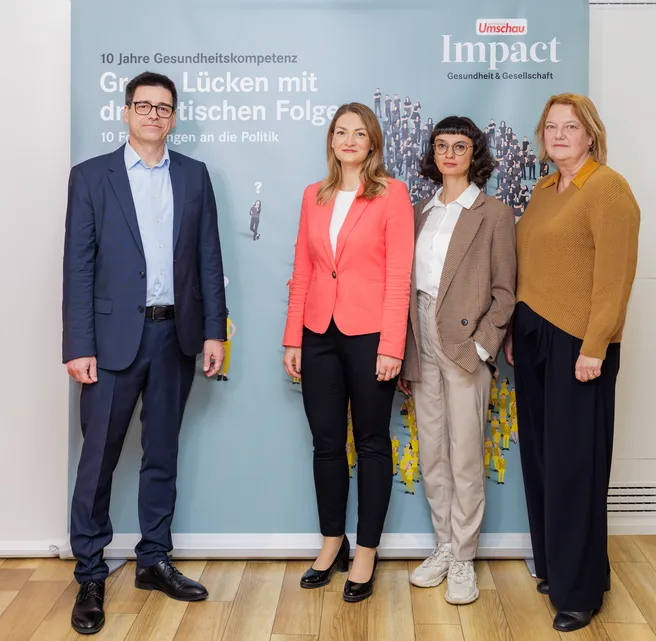In a world full of health information - ranging from social media platforms to traditional news formats and medical recommendations - it is becoming increasingly important to handle this information competently. Health literacy means being able to find, understand, evaluate, and apply relevant information in order to make informed decisions about one’s own health. However, studies show that this is not always easy for many people.
On Wednesday, April 2, 2025, Dr. Alexandra Fretian, together with Prof. Dr. Kai Kolpatzik presented the results on the state of general health literacy for the year 2024 at the Munich Press Club. The presentation was accompanied by Bavaria’s State Minister for Health, Care, and Prevention, Judith Gerlach.
The results are part of the broader study "Survey Mental Health Literacy in Germany (MHLS-Germany)," which focuses on both general and mental health literacy. The study was conducted by the Assistant Professorship of Health Literacy, led by Prof. Dr. Orkan Okan, along with research associates Dr. Alexandra Fretian and Dr. Torsten Bollweg. The project was carried out in collaboration with the IDG Institute for Digital Health and the Wort & Bild publishing house, receiving funding of €108,900.
Prof. Okan highlighted the importance of the study: "For over ten years, we have been researching health literacy in different population groups in Germany, and our latest results clearly show that more and more people are struggling with health-related topics—both in the area of physical and mental health."
The online survey was conducted between July 16 and August 22, 2024, and included a total of 2,000 participants in the base study, as well as 500 trainees in an additional survey. Since participation took place via smartphone, tablet, or computer, the sample is representative of the internet-using adult population in Germany.
Key Findings on General Health Literacy
The results on health literacy in Germany illustrate a worsening situation in recent years: only 24.2 percent of respondents have a high level of health literacy, while 75.8 percent demonstrate an "inadequate" or "problematic" level. The most significant difficulties reported include evaluating the advantages and disadvantages of treatment options (67.2 percent find this somewhat or very difficult), finding information on how to handle mental illnesses (55 percent), and deciding how to protect oneself from diseases based on media reports (44.2 percent).
Dr. Alexandra Fretian contextualizes the findings: "It is important to emphasize that this is self-reported health literacy—meaning how people perceive their own difficulties in handling health information. Therefore, we must not forget that the results are influenced not only by personal skills and self-efficacy but also by conditions within the healthcare and medical system."
A comparison with previous studies shows a clear decline: in 2014, 54.3 percent of people reported low (perceived) health literacy; by 2020, this number had risen to 64.2 percent. Interestingly, there are hardly any differences between genders, educational groups, or income levels. However, younger people and those from the former West German states perform significantly worse than older individuals or respondents from the former East German states.
"Our analysis shows that sociodemographic factors such as gender, age, education, or income explain only a very small part of the differences in self-reported health literacy. This means that the key influencing factors likely lie elsewhere—possibly in social resources, trust in medical professionals, or individual treatment preferences," explains Dr. Torsten Bollweg.
One factor contributing to this development could be the increasing spread of misinformation on the internet. While social media often amplifies misleading content, personal interaction with doctors remains the most important source of information for managing one’s health.
"To counteract this trend, targeted measures are necessary: strategically placing and disseminating understandable and evidence-based health information, improving healthcare professionals' communication skills, increasing the healthcare system’s sensitivity to different levels of health literacy, and enhancing people's ability to distinguish reliable information from misinformation," concludes Fretian.
Key Findings on Mental Health Literacy
The results on mental health literacy, as a specific part of the overall study, were already presented at a press conference on December 3, 2024, in Berlin.
The findings show that mental health literacy in Germany is generally very low. A total of 86.1 percent of the population has difficulty finding, understanding, evaluating, and applying reliable information about mental health. The most problematic areas include assessing whether information on support services is commercially influenced (69.1 percent), recognizing when a professional diagnosis is necessary (68.3 percent), and determining whether media reports on mental illnesses are trustworthy (68.3 percent).
The situation is similar among trainees, with 79.6 percent exhibiting low mental health literacy. Notably, people in the former West German states perform worse than those in the former East German states, while gender, age, and income show no significant differences. However, individuals with lower education levels or a migration background struggle more with handling mental health information. More than two-thirds (69.9 percent) of respondents know someone with a mental illness—including themselves.
On a positive note, male trainees and those with a medium level of education demonstrate slightly higher mental health literacy. Regional differences between East and West Germany play little role among trainees.
"Based on these findings, we see the necessity of investing in strengthening both mental and general health literacy - taking individuals, institutions, and the political field into account systematically. We must particularly emphasize improving health literacy in schools and education, as this is where we lay the foundation for healthy development and reach all children and young people," concludes Prof. Okan.
To the homepage of the Assistant Professorship of Health Literacy
To the MHLS-Germany project homepage
To the General Health Literacy report
To the Mental Health Literacy report
Contact
Prof. Dr. Orkan Okan
Assistant Professorship of Health Literacy
Georg-Brauchle-Ring 60/62
80992 Munich
Phone: +49 89 289 24986
Email: Orkan.Okan[at]tum.de / info.healthliteracy[at]tum.de
Dr. Alexandra Fretian
Assistant Professorship of Health Literacy
Georg-Brauchle-Ring 60/62
80992 Munich
Phone: +49 89 289 24991
Email: Alexandra.Fretian[at]tum.de
Dr. Torsten Bollweg
Assistant Professorship of Health Literacy
Georg-Brauchle-Ring 60/62
80992 Munich
Email: Torsten.Bollweg[at]tum.de
Text: Bastian Daneyko
Photos: W&B/Thomas Dashuber/Private



